Rad Sign
IN KOŠTUNIĆI, ON SUVOBOR, THE FIRST SERBIAN MOUNTAIN BEACH
Gifts of the Earth and Sky
This is that the grain of Serbia from which everything sprouts all over again. That beautiful scenery, the healthy water and food, hardworking and noble people. Certain wisdom and effort, and investments, of course, are necessary so that all this would shine in its full and irresistible splendor. That is why people ccome here aall the way from Cacak, Milanovac, Pozega, Valjevo, but also from Sweden, France, Russia, from all over. The beauty and grace do not need to be explained, we should just let ourselves to hem
By: Miloš Lazić
Photo: Saša Savović
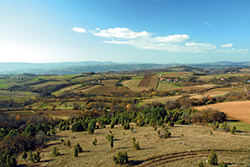 If you go there via Rajac, the road is shorter and more beautiful, but it is faster via Čačak and Pranjane. It will be like this until they have completed the E-763, known here as Corridor 11. When taking the shorter route to Kostunići, it takes more than three hours by car, but it's worth it. Because, everything they say about this corner of Serbia is the truth: water from Čemernica is really drinkable, and the only time it is not good is in the spring when it overflows, and after heavy rains, and the air is clear as a stream. And the same goes for the remaining five rivers that flow through the village, in Drenovača, Bukovača, Grab, Dučina and Šiban. This is because the closest factory stack, if releasing smoke at all, is 25 kilometers away. From the above, from Ravna Gora, a great view extends of almost half of Serbia, forests are abundant, and the domestic animals roam lazily in green pastures grazing the nightshade. People are few, but if one comes to talk to a traveller, all will be compensated.
If you go there via Rajac, the road is shorter and more beautiful, but it is faster via Čačak and Pranjane. It will be like this until they have completed the E-763, known here as Corridor 11. When taking the shorter route to Kostunići, it takes more than three hours by car, but it's worth it. Because, everything they say about this corner of Serbia is the truth: water from Čemernica is really drinkable, and the only time it is not good is in the spring when it overflows, and after heavy rains, and the air is clear as a stream. And the same goes for the remaining five rivers that flow through the village, in Drenovača, Bukovača, Grab, Dučina and Šiban. This is because the closest factory stack, if releasing smoke at all, is 25 kilometers away. From the above, from Ravna Gora, a great view extends of almost half of Serbia, forests are abundant, and the domestic animals roam lazily in green pastures grazing the nightshade. People are few, but if one comes to talk to a traveller, all will be compensated.
If someone interested in geography, Koštunići is twenty-five kilometers away from Čačak, forty from Gornji Milanovac, and the same from Pozega, and as much as sixty from Valjevo. Although it is the second in Serbia by its surface area, the village has barely two hundred households, mostly scattered around the undulating beauty: all in all, about six hundred souls.
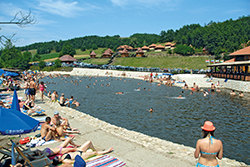 People are similar as everywhere, those hardworking, good and virtuous prevail.
People are similar as everywhere, those hardworking, good and virtuous prevail.
The village center is near the Church of St. Petka, the newest of the three existing, but it slightly exceeds behind the hills, where a curios ethno-village settled down, with a lake created recently, when the Čemernica was dammed. Its banks were chained with hewn stone, and a part covered with sand for beach and swimmers. Upstream is a pond that is teeming with fish, and near the bank there are nine little wooden houses for guests, resembling large tubs, which werre due to the coincidence in numbers and affectionately nicknamed ”Nine brothers Jugović”. Developed sports courts are all around. Above the dam is a nice restaurant for about a hundred guests, and that nobody in the village would be embarrasd for it. On the contrary! And all this is settled at 520 meters above sea level! The rest is above, in the hill.
The central building looks like a large village house from the time of Obrenović dynasty, while the smaller ones surrounding it remind of windowless wooden cabins. They look like this outside, but inside each is equipped with all kinds of miracles of modern times. Between is an ancient linden, and in its shadow a spacious wooden terrace. It is where the guests and locals meet, over rakia, fruit preserves and ice water for welcome, so that no one feels like they are here for the first time. It is here also that they will be saying farewell as if they have just became best of friends, when the time comes.
If someone happens to come there on St. Vitus Day, they will make sure to return at the same time next year.
OLD SCHOOL, NEW STUDENTS
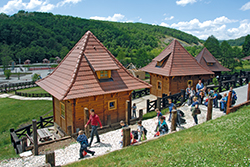 Everything feels like some ecological zone, as they are now called. Because, Ravna gora has been anathematized for decades, and the famous Battle of Suvobor almost forgotten. Therefore, there has been almost no new development here until recently. All this has turned out to be good, at least for what they are planning to do here – to restore and improve the village and agriculture, predominantly production of food, healthy and organic food, before Serbia joins the European Union and they bring that Europe to their villaage.
Everything feels like some ecological zone, as they are now called. Because, Ravna gora has been anathematized for decades, and the famous Battle of Suvobor almost forgotten. Therefore, there has been almost no new development here until recently. All this has turned out to be good, at least for what they are planning to do here – to restore and improve the village and agriculture, predominantly production of food, healthy and organic food, before Serbia joins the European Union and they bring that Europe to their villaage.
The idea came from Jovan Čeković, an occasional resident of Koštunići. In his former life he was a general, and he spend his lifetime a little in the military diplomacy, a little in military economy, the dedicated one, and retired young, just to continue where he left off. Perhaps out of spite, but more to leave a trail behind, he decided to build an ethno-village, an endowment, so to speak, in his homeplace. not for profit, but to employ those few children that are left there, to bring some youth energy into the village and help it survive. Because, according to the story of the evillage priest, which now there is almost no one to hear, until yesterday in its spacious but, by the number of souls, small parish, five to six homes have been permanently closed every year.
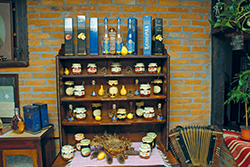 One ethno-village already sprouted in Koštunići about twenty years ago, probably the first in Serbia. They wrote in newspapers about it, he was on TV all the time. They said that he was a role model for many of the remaining two hundred and fifty, as there are now! Yes, it sprouted, but it also withered. It is that old story about government property that belongs to everyone and no one.
One ethno-village already sprouted in Koštunići about twenty years ago, probably the first in Serbia. They wrote in newspapers about it, he was on TV all the time. They said that he was a role model for many of the remaining two hundred and fifty, as there are now! Yes, it sprouted, but it also withered. It is that old story about government property that belongs to everyone and no one.
– That is why I decided to build this ethno-village by myself, on my own land, to hire about twenty people to work there and to earn a fair wage. But it got out of control, became independent, and now it employs three times as many people, and in the high season, when there is most work both on the eland and in the Centre, there are as many as two hundred. And yet, that something has really changed for the better, I understood from something else: nobody has ever heard of Koštunići before, so the local villagers presented themselves as if they were from Pranjani, while today those from Pranjani claim to be from Koštunići!
The only concession to himself Jovan Čeković did when he officially named the ethno-village with the lake after his father; the Tourist and Recreational Center "Momcilo Čeković”.
– It does belong to him. – It all sported on his land! If my Momčilo could have seen this, he would have left happyly... although he was hard to please.
COW ON LEASE
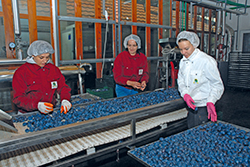 It started ten years ago, when he bought an old log cabin and disassembled it, marking carefully its every part, and then transferred it here. When it was later assembled, it was even more beautiful than before. It is now the central building. And then, little by little, something would sprout every year. That is how, I guess, most of the other ethno-villages in Serbia were built, but they are usually organized as family cooperatives, while this is organized as a real company.
It started ten years ago, when he bought an old log cabin and disassembled it, marking carefully its every part, and then transferred it here. When it was later assembled, it was even more beautiful than before. It is now the central building. And then, little by little, something would sprout every year. That is how, I guess, most of the other ethno-villages in Serbia were built, but they are usually organized as family cooperatives, while this is organized as a real company.
– When the prefix ”ethno” is given to a village, you cannot buy groceries in a grocery store, and import ”handicrafts” from abroad, thus cheating the guests – explained Danijela Damljanović, Director. – You can do it once, and then what? So we immediately established the rule that everything we offer is local. And everything people eat or drink here is produced in Koštunići, and we only buy oil, sugar, salt, coffee, spices and – beer and mineral water. In order to stay like this, someone has to produce it, all that must be of good quality, just when you are producing for yourself. It was up to us to organize all that and pay it fairly, which we do, and that is why the farmers make much more money than when they sell their products in the market in Čačak or Melanoma!
Only, they did not stop at that!
Once some idle walkers wondered into a yard of a farmer, and he was just taking a pregnant cow out of the barn. Impressed, the started praising it, and asked him where he got it, and he told them, just like that, that he had taken it on lease. The guests got offended, they thought he was joking, making fun of them, but when he explained everything in detail, it all came together. Because, it really turns out tu be like that. From the ethno-village they donated to the neighbors some cattle, about a hunderd, and in turn, when the need arises, these they should deliver their products such as kajmak, cheese, eggs, fresh and dried meat, vegetables, fruit, wheat or corn flour, mushrooms... and it is good for everyone, there is even more than enough.
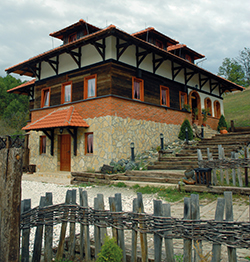 For this reason they built a dryer, refrigerator, plant for the production and bottling of exceptional fruit rakias, primarily plum rakia, and for honey ... and many more wonders. Today these are little factories unified under the same name ”Grab”, after the creek. So, when a guest takes any such”souvenir” from Serbia, it will truly reminiscent of Koštunići, the hosts, and the time they spent here, at the foot of Suvobor.
For this reason they built a dryer, refrigerator, plant for the production and bottling of exceptional fruit rakias, primarily plum rakia, and for honey ... and many more wonders. Today these are little factories unified under the same name ”Grab”, after the creek. So, when a guest takes any such”souvenir” from Serbia, it will truly reminiscent of Koštunići, the hosts, and the time they spent here, at the foot of Suvobor.
– Once I got a visit from Ljuba Jovković, an old friend who lives in Marseille, where he runs a decent family hotel – Jovan says seriously. - He heard, he says, that we produce organic foods, and as the French are crazy about it, he decided to offer them something ”made in Serbia”, to boast how we also know how to make something right. But, when he tried, he almost had a stroke, and he insisted that we make a business deal. We barely restrained him, and that only when we explained that this is intended primarily for the local guests. But if his French people really care so muc, they can stop by, they wwill get an original of everything, at the very source.
When he was goingt back, they packed for him a bit of everything. He called a day or two later to boast that what he had brought was gone immediately, and that everything was bought by the French, right befor ethe noses of the local Serbs. He cried that they sent more of that. It may be the case, but if things develop the waay they planned.
VILLAGE DIPLOMACY
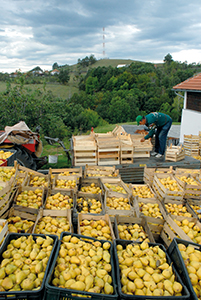 Roughly, Koštunići lake with its beach could accommodate at least two thousand swimmers, while there are about six hundred people living in the village, half of whom would not dare to jump into water even at gunpoint, not even to moisten their feet. But they have not miscalculated. This benefit is primarily intended for guests of the Center, then the residents of Koštunići and the surrounding villages, and finally those from Čačak and Milanovac, for whom this is a substitute for the increasingly remote sea. Admission is free for guests, and the rest paid symbolically, only to cover the cost of water and electricity. And, as the prices at the restaurant are far below those in the town, it is sometimes difficult to get hold of free space on the beach, let alone in the restaurant.
Roughly, Koštunići lake with its beach could accommodate at least two thousand swimmers, while there are about six hundred people living in the village, half of whom would not dare to jump into water even at gunpoint, not even to moisten their feet. But they have not miscalculated. This benefit is primarily intended for guests of the Center, then the residents of Koštunići and the surrounding villages, and finally those from Čačak and Milanovac, for whom this is a substitute for the increasingly remote sea. Admission is free for guests, and the rest paid symbolically, only to cover the cost of water and electricity. And, as the prices at the restaurant are far below those in the town, it is sometimes difficult to get hold of free space on the beach, let alone in the restaurant.
It is interesting that this village was somehow discovered by foreigners, and they often drop by. Recently, a large group of young Swedes stayed here for a month: they encamped in Koštunići, and from there they cruised around Serbia studying our folklor. Tey didn’t want to leave at the end, they fell in love so much with village, nature and the people.
So, people in Koštunići came to an unusual idea. They offered to several foreign diplomats as a gift, land up above the Centre, to build houses there in their national style to go there on vacation and bring guests. All of them have accepted the gift with enthusiasm, and with gratitude, and will soon a true ”diplomatic settlement” will be built here. It remains for the friendly villagers to learn a few words in English or Russian, and they will be ready to embark on the ”International Relations”. And generally – there is no better diplomacy than Serbian chastity and cordiality, local food and drinks, and this much beauty that God has given to us.
When asked why he engaged in this, rather uncertain adventure, the host was thoughtful for a moment, then uttered almost emarassingly:
– In my working life, I earned enough, I do not need more. But just because of that I feel an obligation to repay to this people. That's why some time ago I established the Association of Serbian Hosts, which gathers under its wing truly reputable hosts and businessmen from the country and the Diaspora who have that same need to repay their motherland... and to help hiter. Not everyone can be compared with Ilija Milosavlјević, Luka Ćelović, Nikola Spasić, Vlajko Kalenić, Sima Andrejević or Miša Anastasijević, with people who restored and improved Serbia in the past century and century before that, but if each of us contributes a little, as much as e can, everything would start getting better. because, as Nikola Spasić described it long ago, wealth is not measured by how it is acquired, but by how it is used. If it benefits the people, for sure you will not go wrong.
***
Children
As someone said – so that they don’t get sad every year when they announce that fewer and fewer students are getting enrolled in the old school. Well, God willing, if there is enough of them to finally open an eight-grade school in their village, so that the children of the fifth would not have to walk six kilometers to Pranjani and, in cold winters and hot summers, as their fathers and grandfathers had to do.
***
Lesson
People in Koštunići thought to increase the production of healthy food because of the Frenchman. But they recalled that the Serbian winemaking ruined socialism with the idea that the winemakers would compete in quantity but not in quality, and they gave up.
